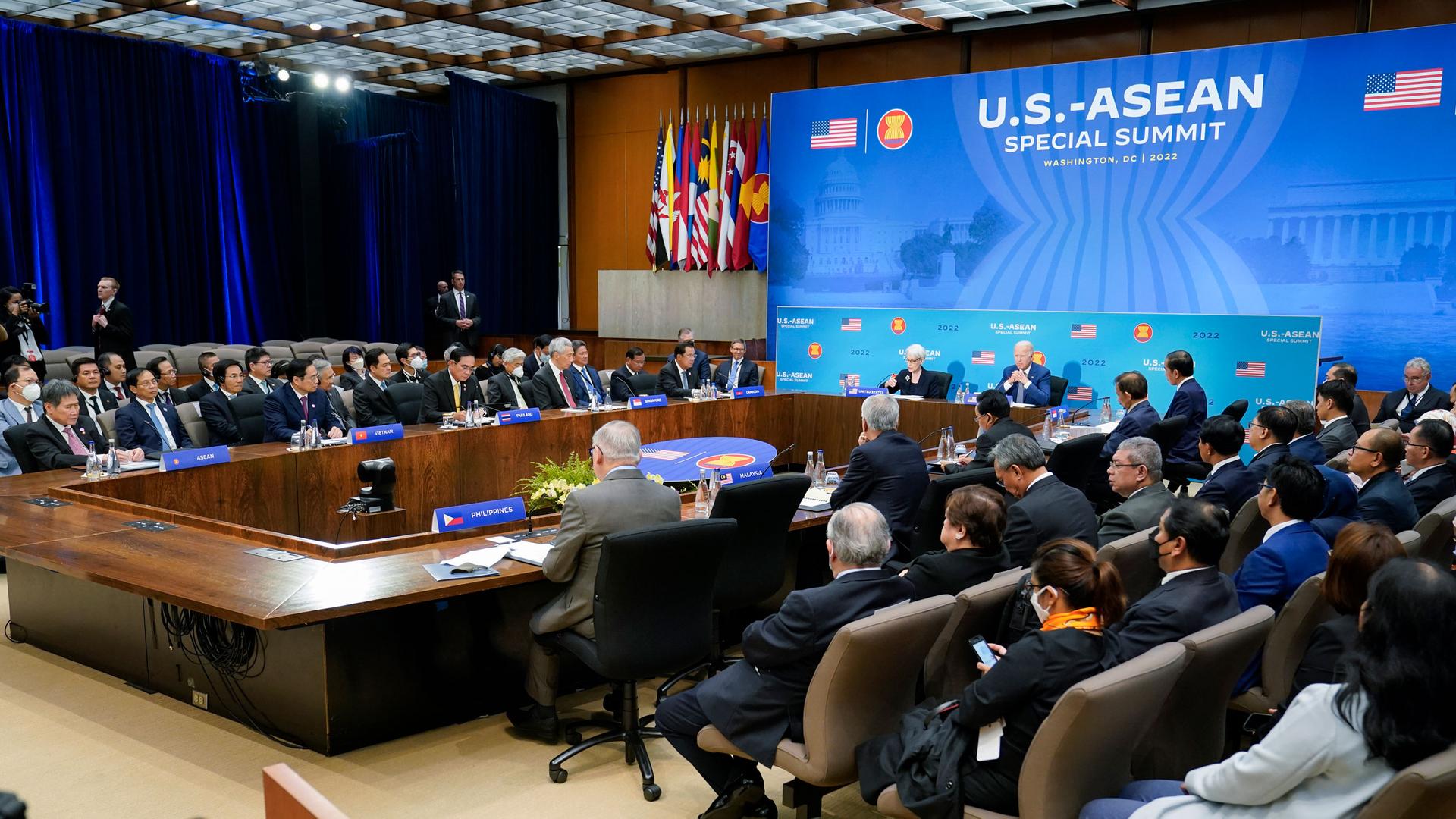Last week, the Biden administration turned its attention to Southeast Asia with a historic convening in Washington.
For the first time, leaders of the Association of Southeast Asian Nations (ASEAN) representing a 10-country regional bloc were summoned to the White House to launch a “new era in relations,” President Joe Biden said.
Biden pointed to a host of global challenges that make the ASEAN-US partnership “critical” at this time, alluding to Russian aggression in Ukraine, among other issues. But some experts who focus on Southeast Asia say the administration came up short at the summit.
Related: Amid war in Ukraine, India maintains ‘strategic partnership’ with Russia
Derek Grossman, a senior defense analyst at RAND Corporation, said as far as he can tell, “there were no specific deliverables.” Even the headlining commitment of $150 million for the region’s pandemic preparedness, infrastructure, security and other efforts is laughable, he said.
“I think it’s pretty insulting, to be honest,” Grossman told The World.
“I think it’s pretty insulting … To pledge such a paltry amount to a region that Biden himself, at the White House, during the summit, that ASEAN centrality is at the heart of his administration’s Indo-Pacific strategy.”
“To pledge such a paltry amount to a region that Biden himself at the White House, during the summit, you know, he said that ASEAN centrality is at the heart of his administration’s Indo-Pacific strategy.”
Many aspects of this strategy are clearly aimed at countering Beijing’s economic power in the region, but they are not explicitly anti-China. And not releasing more details about the Indo-Pacific Strategy’s economic framework during the summit was a missed opportunity, Grossman said.
Those plans are slated to be released later this month.
“I mean, when you look at what China’s doing on the other side of the ledger here, I mean, they’re literally investing billions — with a B — dollars through their Belt and Road initiative throughout Southeast Asia,” he said.
Beijing’s Belt and Road Initiative is a program worth trillions of dollars that looks to establish a vast network of investment and infrastructure spanning Asia, Europe and Africa.
Exact numbers are hard to come by, but in 2019, China invested an estimated $166 billion into Southeast Asia and its emerging markets, according to the nonpartisan, Philadelphia-based Foreign Policy Research Institution.
Today, the total would be billions more.
With a total population of over 600 million, ASEAN has a gross domestic product of some $2.55 trillion. If it were its own country, the bloc would be the 5th largest economy in the world.
China’s trade with Southeast Asia totaled $685 billion in 2020. That’s nearly twice the $362 billion the region traded with the US in the same year.
Related: Southeast Asia allies express concern over US commitment amid Afghanistan crisis
Still, Marc Mealy, senior vice president for policy at the DC-based US-ASEAN Business Council, points out that six of the United States’ top 30 trade partners in the world are in ASEAN, with Vietnam leading the pack. This indicates the importance of the relationship between the two countries, he said.
The $150 million investment may not be a stand-out commitment in light of Congress’ allocation of $40 billion in aid to Ukraine, but other notable commitments were made at the summit, Mealy said.
Yohannas Abraham, who currently serves on President Biden’s White House National Security Council, was announced as the nominee for US Ambassador to ASEAN. The post has been vacant since the Trump administration.
Mealy also noted that other initiatives were announced, including the revamping of a training initiative for young Southeast Asian leaders, as well as a bilateral agreement between Malaysia and the US on semiconductor supply chains.
Meanwhile, Indonesian President Joko Widodo met with billionaire businessman Elon Musk on the sidelines and Mealy’s group hosted an event that brought together ASEAN leaders with US chief executive officers and cabinet secretaries.
“I think there’s lots of other initiatives that, at the end of the day, really do offer some tangible benefits in terms of strengthening the US-ASEAN economic relations.”
“I think there’s lots of other initiatives that, at the end of the day, really do offer some tangible benefits in terms of strengthening the US-ASEAN economic relations,” Mealy said.
Related: Opening the door to Chinese investment comes with risks for Southeast Asian nations
Still, for a region that feels perpetually ignored by the US, it’s unclear whether the summit ultimately sent the intended message.
Reactions from some Southeast Asian figures, such as leaders of Singapore and Vietnam, appear positive, according to Hunter Marston, a doctoral researcher at Australian National University in Canberra, and a contributor for 9DashLine, a platform that focuses on Asian and Indo-Pacific relations.
“I think the Biden administration walked a fine line and not pushing ASEAN states too hard to either break ties with Russia entirely, which it understands is unrealistic given Russia’s strategic importance to many Southeast Asian countries, and also not to sort of choose sides in this competition with China.”
“I think the Biden administration walked a fine line and not pushing ASEAN states too hard to either break ties with Russia entirely, which it understands is unrealistic given Russia’s strategic importance to many Southeast Asian countries, and also not to sort of choose sides in this competition with China,” he said.
Southeast Asian leaders still crave more specifics, Marston said, particularly on how the US can help them economically.
“So hopefully, we’ll see the Indo-Pacific economic framework announced soon with further detail,” he said. “And if that contains a little more meat on the bones, it’ll only add to the appeal that Washington strategy has for regional partners.”
